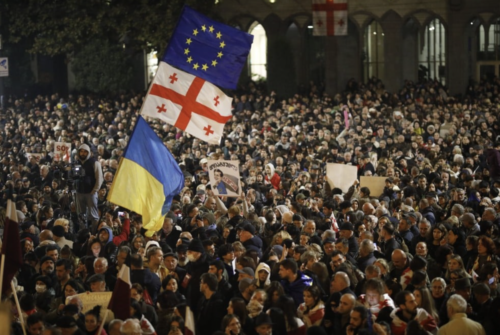Georgia, the mountainous nation-state that sits astride the Caucasus mountains, has long been torn between East and West. Georgia has substantial historical and cultural ties to Russia – Stalin was born in the hamlet of Gori there – but is also menaced by Vladimir Putin, whose army invaded in 2008 and who backs the separatist regions of Abkhazia and South Ossetia. Similarly, it craves the security and wealth the European Union. could provide but is worried that European influence would precipitate uncomfortable liberalization.
It is against this backdrop that Georgia held elections on October 26, 2024 which the opposition framed as a last chance to unseat the current pro-Russian government and align the nation with the E.U. Yet, the ruling Georgian Dream party walked away with 56% of the vote: the four main opposition parties took home just 38%. Salome Zourabichvili, who despite being the incumbent Georgian Dream president has aligned herself with the opposition, has cried foul, describing the result as a “falsification.” Indeed, election-monitoring groups and statisticians have found what they call proof “of large-scale election fraud.” It is unlikely, though, that the results will be reversed: most of the evidence is circumstantial.
The E.U., with which Georgia was in accession talks, has paused negotiations with Tbilisi. How did Russia pull off this bloodless coup?
For one, Putin’s trolls and spy agencies promoted an elaborate conspiracy theory, which held that a “Global War Party” from the West was attempting to push Georgia into conflict with Russia. The other supposed initiatives of the Global War Party are freemasonry and “LGBT propaganda.” Russia has organized vote-buying rings in other countries, like Moldova: there is a question of whether Putin has used similar tactics in Georgia.
Despite the discrepancies in voting procedures, the magnitude of Georgian Dream’s victory insulates them from much criticism, as does the cautious rhetoric of the party. Even Georgian Dream is, like 80% of Georgians, notionally in favor of E.U. membership. They have retained a paper commitment to European integration even as they have passed anti-democratic legislation, such as a bill last year that required any organization receiving more than 20% of its funding from abroad to declare itself a “foreign agent.”
Affected most were human rights NGOs which receive grants from the E.U. and the United States
If, as looks increasingly likely, Georgian Dream successfully downplays the extent to which the election was influenced by Russia, there will be further unrest in the streets of Tbilisi. Already, riot police have been called to disperse protests: if they succeed in snuffing out the opposition, then there may soon be no hope of integrating with the E.U. or rekindling Georgia’s sputtering democracy.






